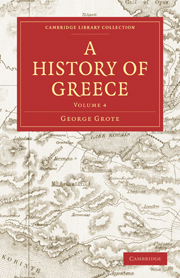Book contents
- Frontmatter
- Contents
- PART II CONTINUATION OF HISTORICAL GREECE
- CHAPTER XXV Illyrians, Macedonians, Pæonians
- CHAPTER XXVI Thracians and Greek Colonies in Thrace
- CHAPTER XXVII Kyrênê.—Barka.—Hesperides
- CHAPTER XXVIII Pan-Hellenic Festivals—Olympic, Pythian, Nemean and Isthmian
- CHAPTER XXIX Lyric Poetry.—The Seven Wise Men
- CHAPTER XXX Grecian Affairs during the Government of Peisistratus and his Sons at Athens
- CHAPTER XXXI Grecian Affairs after the Expulsion of the Peisistratids.—Revolution of Kleisthenês and Establishment of Democracy at Athens
- CHAPTER XXXII Rise of the Persian empire.—Cyrus
- CHAPTER XXXIII Growth of the Persian Empire
- CHAPTER XXXIV Dêmokêdês.—Darius invades Scythia
- CHAPTER XXXV Ionic Revolt
- CHAPTER XXXVI From Ionic Revolt to Battle of Marathon
- CHAPTER XXXVII Ionic Philosophers.—Pythagoras.—Kroton and Sybaris
- Titles in the Series
CHAPTER XXIX - Lyric Poetry.—The Seven Wise Men
Published online by Cambridge University Press: 29 August 2010
- Frontmatter
- Contents
- PART II CONTINUATION OF HISTORICAL GREECE
- CHAPTER XXV Illyrians, Macedonians, Pæonians
- CHAPTER XXVI Thracians and Greek Colonies in Thrace
- CHAPTER XXVII Kyrênê.—Barka.—Hesperides
- CHAPTER XXVIII Pan-Hellenic Festivals—Olympic, Pythian, Nemean and Isthmian
- CHAPTER XXIX Lyric Poetry.—The Seven Wise Men
- CHAPTER XXX Grecian Affairs during the Government of Peisistratus and his Sons at Athens
- CHAPTER XXXI Grecian Affairs after the Expulsion of the Peisistratids.—Revolution of Kleisthenês and Establishment of Democracy at Athens
- CHAPTER XXXII Rise of the Persian empire.—Cyrus
- CHAPTER XXXIII Growth of the Persian Empire
- CHAPTER XXXIV Dêmokêdês.—Darius invades Scythia
- CHAPTER XXXV Ionic Revolt
- CHAPTER XXXVI From Ionic Revolt to Battle of Marathon
- CHAPTER XXXVII Ionic Philosophers.—Pythagoras.—Kroton and Sybaris
- Titles in the Series
Summary
The interval between 776—560 b.c. presents to us a remarkable expansion of Grecian genius in the creation of their elegiac, iambic, lyric, choric, and gnomic poetry, which was diversified in a great many ways and improved by many separate masters. The creators of all these different styles—from Kallinus and Archilochus down to Stesichorus—fall within the two centuries here included; though Pindar and Simonidês, “the proud and high-crested bards,” who carried lyric and choric poetry to the maximum of elaboration consistent with full poetical effect, lived in the succeeding century, and were contemporary with the tragedian Æschylus. The Grecian drama, comic as well as tragic, of the fifth century b.c., combined the lyric and choric song with the living action of iambic dialogue—thus constituting the last ascending movement in the poetical genius of the race. Reserving this for a future time, and for the history of Athens, to which it more particularly belongs, I now propose to speak only of the poetical movement of the two earlier centuries, wherein Athens had little or no part. So scanty are the remnants, unfortunately, of these earlier poets, that we can offer little except criticisms borrowed at second-hand, and a few general consideration on their workings and tendency.
- Type
- Chapter
- Information
- A History of Greece , pp. 99 - 136Publisher: Cambridge University PressPrint publication year: 2010First published in: 1847



